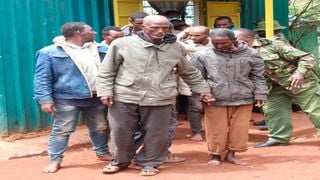
Ten ethnic clashes suspects walk out of the Marsabit resident magistrate’s court on July 14, 2021. Residents have called on President Kenyatta to order an inquiry into the culpability of all local leaders in the violence.
| File | Nation Media GroupMarsabit
Premium
Marsabit anarchy: Residents say politicians are to blame
On the streets of the booming Marsabit town, tension lurks.
Heavily armed police officers in jungle fatigues patrol the streets in heavy duty trucks as an Armoured Personnel Carrier (APC) rolls down the main Marsabit-Moyale highway dissecting the town.
Armed with heavy artillery and with their faces hidden in balaclavas, the officers drawn from the General Service Unit (GSU), Border Patrol Unit (BPU) and Rapid Deployment Unit (RDU) keep watch. Their mission: put an end to the anarchy experienced here for over a month.
Militants from the Gabra and Borana communities have engaged in ethnic violence that has turned the usually calm town into a battleground. At least 20 people have been killed and hundreds forced to flee their homes.
Open season
One would think that the heavy security presence would scare the militias, but no, for them, it is open season. About a week ago, they even attempted to ambush a convoy of police, community elders and journalists at Manyatta Dabba on the town’s outskirts.
A last-minute warning from the lead vehicle saved the convoy of over 60 people from an ambush as police called off the operation.
“We were driving into an ambush. Men with machine guns had already taken positions inside the damaged houses waiting for a massacre. If even armed police will not dare enter that place, how can the government guarantee us peace?” posed Mr Hassan Wakho Jarso.
Sporadic killings and forceful displacement of people between the Gabra and Borana communities have escalated into a full-blown war, with politicians inciting the violence.
Recent findings by the Nation suggest that politicians and community elders have gone to the extent of hiring mercenaries. Allegations have also emerged that foreign militias are involved in the fighting, with support through public funds and state resources, including weapons.
Unending search for peace
The search for peace in the northern frontier has been ongoing for decades with little success. Mediators, both local and foreign, have taken a crack at resolving the issues that have gradually shifted from competition for natural resources to political greed and thirst for power.
In the past, these confrontations were mostly in rural areas and were characterised by single digit killings and livestock theft. But in the last six months, they have escalated to urban centres, resulting in a spike in casualties, including women and children.
A few weeks ago, for example, an 11-year-old girl was shot dead in broad daylight outside her school near Jirime. Sabdio Salad, a Standard Five pupil, was killed by militants alongside her uncle and his friend as they headed home.
“She was an innocent child who knew nothing about tribalism or politics. But she was killed. I have lost a child because of selfish interests of politicians,” her father, Salad Jarso said.
Crossed the red line
For residents of Jirime, who are predominantly Gabra, the girl’s killing crossed the red line. This led to retaliatory attacks in which Borana homes were demolished and torched. This escalated into a war that turned Marsabit town into a battlefield.
Fighters from the Oromia Liberation Front took control and killed at will. They terrorised residents, mostly targeting businesses belonging to the Gabra. Their bravado drew the attention of the state with Inspector-General of Police Hilary Mutyambai ordering a security operation.
Still, the puzzle of the foreign militia remains: on whose orders they acting? Who funds them?
Taking advantage of the porous border points, politicians have been accused of facilitating illegal entry of the OLF fighters into Marsabit. Earlier this year, the Interior ministry confirmed the presence of OLF fighters.
“Government military attire, drugs, OLF uniforms, relief food, civilian clothes... among other items were found in the camp believed to be predominantly occupied by the OLF members. OLF members have been staging attacks on the Gabra with the knowledge, blessings and funding from politicians of one community,” the ministry stated on March 10.
“There is a consistent trend of violence every time the Treasury releases funds. At the same time, projects that are proposed either never take off or are overpriced. This can only mean the money is being diverted, and we believe it goes to the militias,” said Mr Kanchora Chepe, a local leader.
Nepotism
With nepotism prevalent in public offices, politicians are said to be using proxies to divert funds to arm these groups. They also protect them by either intimidating police officers or interfering with investigations.
“Whenever we make arrests, we get calls from prominent politicians who demand release of the suspects on account that they protect their communities. Some use their influence on top government officials to push for their release,” said an officer.
And when politicians’ wallets run dry, community elders reportedly collect money in the name of protection fees. Each household contributes up to Sh3,000 monthly and the funds are used to arm militias.
President Uhuru Kenyatta summoned local leaders to State House last week over the fighting, but they have, remained mum on what transpired. State House issued a statement noting the involvement of politicians.
Residents have called on President Kenyatta to order an inquiry into the culpability of all local leaders in the violence. Mr Barille Abduba said those found guilty should be prosecuted. Similar sentiments were echoed by local activist Nuno Galmah who said empty threats would not remedy the situation. He urged the President to deploy the military to mop up illegal firearms in the hands of civilians.




